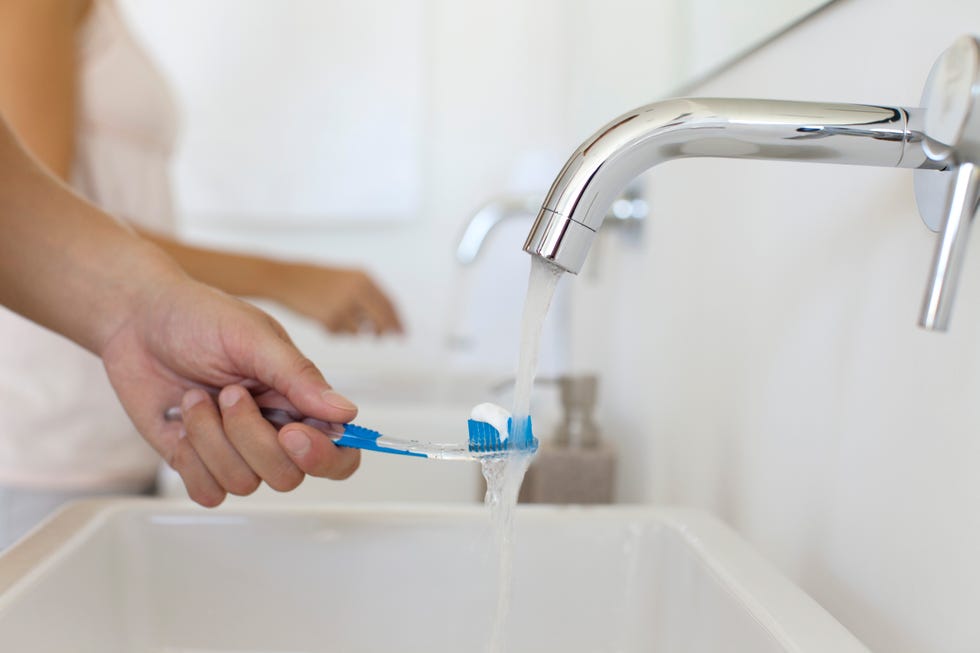The Truth About the TikTok Claim That Fluoride Is Bad
BRUSHING YOUR TEETH is probably something you do on autopilot. You brush at least every morning and before bedtime, and chances are, the toothpaste you’re using contains fluoride.
But you might have seen some recent TikTok posts suggesting that fluoride is toxic and wondered if there’s any truth to these claims.
The benefits of fluoride for your teeth have been well-established for decades, but “the controversy about fluoride goes back to the very beginning,” says Howard Pollick, B.D.S., a spokesperson on fluoridation for the American Dental Association and professor at the University of California, San Francisco.
For years, communities have protested water fluoridation, and Dr. Pollick says people once believed fluoride caused bone cancer, but no evidence ever established a connection. So it’s not surprising that more recently some TikTokkers have claimed fluoride “does more harm than good.”
Fluoride is a naturally occurring mineral that’s “crucial for our dental health because it helps to prevent tooth decay” and reduces your risk for cavities, says Cheryline Pezzullo, D.D.S., director of community-based programs and clinical assistant professor at the NYU College of Dentistry.
The mineral is found in most well-known brands of toothpaste and mouthwash and occurs naturally in some foods. Many communities have also added fluoride to tap water to prevent tooth decay. Its use is supported by the American Dental Association, the American Academy of Pediatrics, the American Public Health Association, and other groups.
While fluoride (and, really, almost anything else) can be toxic when ingested in large quantities, Dr. Pollick said the amount of the mineral in toothpaste and drinking water is safe, and there’s little risk to adults. Several dentists on TikTok also tout the benefits of fluoride and debunk misinformation about it.
Still, Dr. Pezzullo says her patients ask her about the safety of fluoride “all the time.” Here’s what dentists want you to know.
The Dental Health Benefits of Flouride
Fluoride’s dental health benefits were discovered in the early 1900s when a dentist in Colorado noticed several patients had brown stains on their teeth but no cavities. After researching the phenomenon, he discovered that it was connected to fluoride that was naturally found in their drinking water.
While those fluoride levels were too high and caused dental fluorosis, or teeth staining, scientists later discovered that fluoride in smaller quantities offered benefits without fluorisis.
Fluoride began being added to drinking water in smaller amounts in the 1940s, and there was a “big decrease in the rate of cavities,” especially among children, says Kenneth Markowitz, D.D.S., associate professor of oral biology and restorative dentistry at the Rutgers School of Dental Medicine.
Today, the U.S. Public Health Service recommends an optimal fluoride concentration of 0.7 milligrams per liter for public water systems. Fluoride has also been an ingredient in toothpaste, mouthwash, and other dental products for decades.
Fluoride helps your teeth by essentially remineralizing them, Dr. Pollick says.
Most of your teeth are made of hydroxyapatite, a type of calcium phosphate. When your teeth come into contact with acid from bacteria and sugar, the minerals in your teeth start to break down, which causes tooth decay, Dr. Markowitz explains. Over time, the tooth’s surface (or its enamel) can continue to break down, causing a hole in the tooth, which is known as a cavity.
Fluoride helps strengthen teeth and makes them more resistant to acid, Dr. Pollick says. This lowers your risk for tooth decay and cavities and even prevents these problems in some cases.
“So, you’ve got this demineralization from the acids and then remineralization from the fluoride,” he adds. “There is no other elemental substance that remineralizes to the same extent the surface of the tooth. And this has been demonstrated for decades.”
How to Get the Flouride You Need
For most people, using toothpaste containing fluoride twice a day and drinking tap water that contains fluoride provides all the mineral you need, Dr. Pezzullo says.
More than 70 percent of the U.S. population on public water systems had access to fluoridated water in 2020, according to the Centers for Disease Control and Prevention. If you don’t live in an area with water fluoridation, brushing with fluoride toothpaste is usually sufficient, Dr. Pezzullo says.
If you’re prone to cavities, she says dentists can prescribe toothpaste with a higher amount of fluoride or apply a fluoride varnish or gel.
People with gum disease or a dry mouth caused by certain medications or some health conditions might also need extra fluoride, Dr. Markowitz says.
Can You Get Too Much Flouride?
It’s rare for adults in the U.S. to get too much fluoride, Dr. Pezzullo says.
Fluorosis, which causes brown or white spots to form on teeth, is possible in areas where the amount of fluoride in water isn’t regulated, she says. Sometimes, well water can have high fluoride levels and may not be regulated by government agencies.
Dental fluorosis really only affects developing teeth, Dr. Markowitz says. Children can be at risk if they consume too much fluoride while their permanent teeth are still forming, such as by swallowing fluoride toothpaste or drinking too much fluoridated water, according to the Cleveland Clinic. Otherwise, fluoride is safe and recommended for children, according to the AAP.
Some groups that oppose fluoride often cite a 2019 study published in JAMA Pediatrics that examined about 600 mother-child pairs in Canada and suggested that IQ levels in 3- and 4-year-olds were lower when their mothers had lighter levels of fluoride in their urine while pregnant.
The researchers suggested that pregnant women might want to avoid fluoride. But the American College of Gynecologists and Obstetricians recommends that pregnant women brush with flouridated toothpaste.
Experts say more research is needed on the subject and that a direct link between fluoride and cognitive issues in children hasn’t been found.
“I don’t think that you can latch onto one study,” Dr. Pezzullo says. “You need years and years of studies and huge populations involved, kind of like the research that’s done to show that fluoride is effective.”
Still, she says she empathizes with parents who are concerned about giving their children fluoride, as it can be tough to sift through the abundance of health information (and misinformation) online.
What Happens If You Use Flouride-Free Toothpaste?
Most dentists recommend against using toothpaste without fluoride, Dr. Pollick says. He emphasizes that fluoride is the only substance that’s been shown to remineralize teeth and prevent tooth decay.
People who oppose fluoride often recommend toothpaste containing hydroxyapatite as an effective fluoride-free alternative. While teeth are made of hydroxyapatite, Dr. Markowitz says there’s little evidence to suggest that it can prevent tooth decay.
A small study published in Frontiers in Public Health in 2023 found that the rate of tooth decay was slightly higher in subjects using hydroxyapatite toothpaste for 18 months compared to those using fluoride varieties. (It’s also important to note that some of the researchers disclosed that were employed by a company that makes fluoride-free toothpaste.)
Dr. Markowitz points out that people with healthy teeth who suddenly stop using fluoride toothpaste likely wouldn’t see any problems right away. It can take years for tooth decay and cavities to develop.
If you choose to use fluoride-free toothpaste, Dr. Pollick said you would need to “restrict your sugar intake severely.” That includes beer, wine, fruit, dairy and sweets. You also need to brush twice a day, floss, and see your dentist regularly, Dr. Pezzullo says.
Why Is Flouride So Controversial?
“What isn’t controversial these days?” Dr. Pollick notes.
Water fluoridation has been a contentious issue since the 1940s, he says. He links anti-fluoride sentiment to the health misinformation floating around the internet and says it’s similar to anti-vaccine movements.
“This is not new,” says Dr. Pezzullo, who suggests talking to your dentist about your fluoride concerns.
Even though there’s no sufficient evidence supporting claims that fluoride is bad for you, she says it’s up to people to choose whether or not they want to use it.
“We’re dealing with people’s bodies, so if someone truly doesn’t want to do it, all I can do as a professional is provide the information that I know and feel to be true based on research because dentistry is based on evidence-based practices,” Dr. Pezzullo says.




